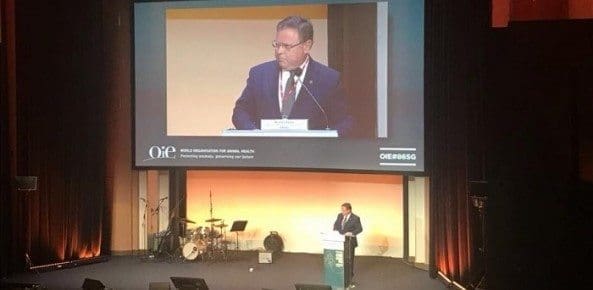BRAZIL’S minister of Agriculture says the country’s status of “free of foot and mouth disease with vaccination”, which Brazil expects to be formalised at this week’sWorld Organisation for Animal Health (OIE) assembly in Paris, is the result of ‘a long and hard trajectory of dedication’ of Brazilian cattle ranchers and the country’s veterinary sector.
Minister Blairo Maggi said many would not have been believed it possible for Brazil to eradicate FMD and become the largest meat exporter in the world.
At the beginning of the fight when vaccinations began in the 1960s, he said, thousands of outbreaks were recorded in Brazil every year.
In the 1990s, combat strategies changed, shifting from disease control to eradication throughout Brazil, with the reformulation of the National Program for the Eradication of Foot-and-Mouth Disease (PNEFA).
“It was many years of applying knowledge and discoveries, dedication of qualified technicians, a lot of struggle of rural producers and entrepreneurs, working in a coordinated and shared manner, the Federal Government, state governments and the private sector, all imbued with the objective of making the Brazil free of Foot-and-Mouth Disease,” Minister Maggi said.
“Many would not believe it and say it was impossible and we would never get it, but we did it.
“And (it is) thanks to the hard work, knowledge, dedication and struggle of generations of technicians, farmers and managers, always guided by the principles, guidelines and recommendations of the OIE, which we are proud to be one of the founding members.”
Minister Maggi said cattle production was of critical importance to the Brazilian economy. In 2017, the sector represented a Gross Value of Production (VBP) of R$175.7 billion. Exports in 2017 grew by 8.9pc to a value of R$15.5 billion.
He said the growth was due to the quality and competitiveness of Brazilian products and the improvement of the sanitary condition of the national herd.
“In this scenario, the victory against foot-and-mouth disease stands out.”
He said the challenge has not yet ended, with the final stage being the eradication of the disease in the country and in South America in order for Brazil to achieve the status of free of foot-and-mouth disease without the vaccine.
“For this, we are fully aware of the need to further strengthen our capacities for prevention, surveillance and response to possible emergencies that may occur.
“I’m sure we can do it. We will continue along the path of science, transparency and trust in the OIE’s valuable guidelines, guidelines and standards. ”
Minister Maggi invited all Brazilians “to pay their respects to the thousands of women and men, many of them already among us, who, through hard work, honesty and knowledge, have made reality what seemed impossible.”
Also in Paris, the president of Brazilian farm lobby group Confederation of Agriculture and Livestock of Brazil (CNA), João Martins, discussed Brazil’s use of a livestock traceability tool called Agri Trade, a system developed by CNA to carry out the management of traceability protocols for voluntary adherence of the beef production chain.
The coordinator of the Technical Group of Sanitary Defense of the CNA, Decio Coutinho, said the platform is specific for beef and is an additional instrument for the operations of Brazilian sanitary certification requirements.
“It has been in operation in the Brazilian market with six protocols since 2016 and its launch at that time was planned to coincide with the recognition of our country as FMD free with vaccination during the 86th General Session of the World Assembly of the World Health Organization. Animal Health (OIE).”
Mr Martins also spoke about the commitment of Brazilian farmers and ranchers to preserve the environment.
“The CNA represents the Brazilian rural producers and participates, together with the government, in several discussions, whether they are on the international market, legislation. The Brazilian Forest Code, for example, which guides our sustainable agriculture, is one of the most rigorous laws in the world,” he said.
He Martins also stressed the importance of research by state-owned Brazilian Agricultural Research Corporation Embrapa for the development of a “new tropical agriculture”, where farmers spend little energy, preserve the springs and plant the forests.
“This all results in sustainable agriculture. Just fly over Brazil to see how livestock and agriculture are done. “
Agriculture Minister Blairo Maggi added that the legislation obliges Brazilian producers to maintain environmental reserve areas on their farms, in addition to protecting rivers, streams, springs or any water course within the property .
“This is how Brazil has been doing agriculture and livestock. Today we can say with absolute confidence that we are the fourth largest food producer and the second exporter, respecting labor and environmental issues. “
The president of the Parliamentary Front of Agriculture (FPA), Congresswoman Tereza Cristina, emphasized that the Forest Code was discussed for nine years to reach current legislation. “Today the rural owners own 100 percent of their areas, but are obliged in the different biomes to preserve of 20pc to 80pc”.
Source: CNA
Source: CNA Brazil




FMD free with vaccination status is noteworthy. The next step will be FMD free without vaccination. Then live cattle exports will be easy going. Until then …..